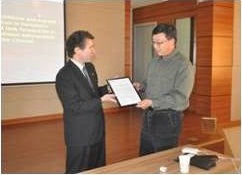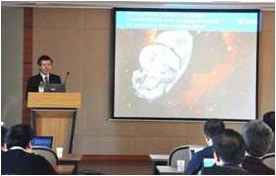Royal Astronomical Society Award for SPIRE Consortium Partly Goes to NAOC
The Royal Astronomy Society (RAS) of the UK has awarded its 2014 Group Achievement Award to the team behind the Herschel Space Observatory's SPIRE instrument on January 10, 2014. Professor David Southwood, President of the Royal Astronomical Society, congratulated the winners: “For nearly two centuries, the RAS has supported the work of astronomers and geophysicists in the UK and around the world. It gives me the greatest pleasure to announce the winners of our medals and awards for 2014, recognising the extraordinarily talented men and women who reach the highest levels of achievement in our field.”
ESA’s Herschel space observatory was launched in 2009 and operated very successfully for four years. By virtue of its unparalleled sensitivity and unique capabilities, SPIRE observed the Universe at far infrared wavelengths, the results obtained using SPIRE have been felt across a broad swath of astrophysics and, in particular, in detailed studies of star formation in the local Universe and extending out to very distant objects. The international team was responsible for the design, construction and delivery of the instrument as part of the instrument suite for Herschel. The award represents recognition by the astronomical community of the outstanding success of the SPIRE instrument.
“SPIRE has been a truly international endeavour, with 18 institutes in eight countries participating, and countless talented people with wide ranging expertise contributing to building and operating the instrument. This Group Achievement award is a fitting tribute to the success of their efforts.” explained Professor Matt Griffin, from Cardiff University, who led the team. “The work of the SPIRE team has led to a great scientific legacy,” explains Laurent Vigroux, from the Institut d'astrophysique de Paris and SPIRE Co-Principal Investigator. “For example, SPIRE's observations of star formation in thin filaments is a major breakthrough that has transformed the field and led to a new theory of star formation.”
NAOC started to take part in the development of the Instrument Control Center of SPIRE since August 2005, and became a member institute of the SPIRE Consortium in 2009. NAOC scientist Prof. Maohai Huang is a consortium Co-Investigator, and Profs. Jinzeng Li, Hong Wu, Ming Zhu have joint the SPIRE Science Team, so have their graduate students. Gsegement Technology Inc., a Beijing based company, provided software engineering support. Dr. Stephan Ott, Development Manager of Herschel Data Processing system pointed out that without well-prepared ground segment Herschel wouldn’t have achieved so much in such a short period, and that the Chinese team has made significant contribution to the successful development of the Herschel ground segment.


Dr. Stephan Ott, Development Manager of Herschel Data Processing presented a letter of appreciation to NAOC Vice Director Prof. Jinxin Hao in December 2012.